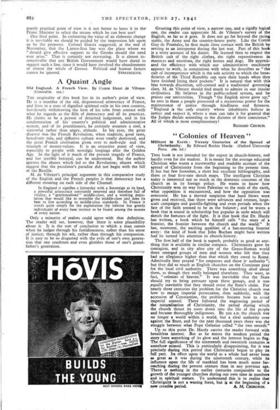A Quaint Angle
Old England. A French View. By Comte Henri de Vibraye- (Constable. ros.)
THE originality of this book lies in its author's point of view. He is a member of the old, dispossessed aristocracy of France, and lives in a state of dignified spiritual exile in his own country, fastidiously withdrawing the hem of his robe from contact with what he regards as the filth of democracy and all its practices. He claims to be a person of detached judgement, and in his condemnation of his' country's political and administrative system, and of its practitioners, he certainly assumes a cool, a sorrowful rather than angry, attitude. In his eyes, the great disaster was the French Revolution, when tradition, good taste, hereditary rule, and diffusive culture were totally destroyed, and the great French civilisation given over to mob-rule and the triumph of money-values. It is an attractive point of view, especially to people with nostalgic longings after the Golden Age. In the light of it much of the present tragedy of France, and her terrible betrayal, can be understood. But the author ignores the abuses which led to the Revolution; abuses which suggest that the peculator's paradise did not begin with the fall of the Bastille.
M. de Vibraye's principal argument in this comparative study of the English and the French peoples is that democracy has a different meaning on each side of the Channel.
In England it signifies a hierarchy with a Sovereign at its head, a powerful aristocracy constantly renewed and therefore full of vitality, a " gentlemanised " middle-class, and a working popu- lation that would like to resemble the middle-class and does its best to live according to middle-class standards. In France it stands quite simply for the exploitation (by inferior but greedy individuals) of every base instinct to be found among the masses of every nation.
Only a minority of zealots could agree with that definition. The reader will see, however, that there is some plausibility about it. It is the sort of conclusion to which a man comes when he judges through his fastidiousness, rather than his sense of justice; through his wit, rather than through his compassion. It is easy to be so disgusted with the evils of one's own genera- tion that one condones and even glorifies those of one's grand- father's generation.
Granting this point of view, a narrow one, and a rigidly logical one, the reader can appreciate M. de Vibraye's survey of the English, so far as it goes. It does not go far beyond the racing stable, the Army and the country-house party. Like the Comte Guy de Pourtales, he first made close contact with the British by serving as an interpreter during the last war. Part of this book is a witty account of his duties. He learned then to respect the British cult of the right clothes, the right repressiveness in manners and emotions, the right horses and dogs. He appreci- ated the efficiency with which our administfative machinery' appears to work, in comparison with what he describes as " the cult of incompetence which is the sole activity to which the bene- ficiaries of the Third Republic can turn their hands when they have finished lining their pockets." It is natural that with this bias towards discretion, self-control and a traditional governing class, M. de Vibraye should- find much to admire in our insular civilisatioa. He believes in the public-school system, and he praises our universities. Though " the English never grow up," he sees in them a people possessed of a mysterious power for the maintenance of justice through kindliness and firmness. "England is the only country whose inhabitants believe in justice and respect it, where a man can take it for granted that the Judges decide according to the dictates of their conscience." All of which is most complimentary!
RICHARD CHURCH.






















 Previous page
Previous page